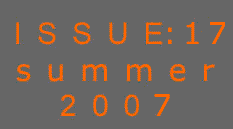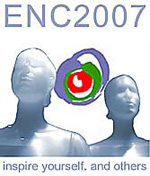
Word from the President

Scientists and the nuclear debate
At conferences devoted to discussing nuclear
energy most of the papers presented deal with technological or
scientific themes. This is certainly not abnormal as most people
working in the nuclear field and attending these conferences are
scientists or engineers and, therefore, tend to consider that
most of the problems relating to nuclear energy - and I mean nuclear
energy in the broader sense, including non-power applications
- are of a scientific or technological nature and can only be
solved as such.
In my opinion, this is the wrong approach. Ever
since scientists and academia have existed, they have been accused
of living in an ivory tower, not aware of the real concerns of
people. One proposition was (and perhaps still is?) that they
considered their knowledge to be of such a complexity that it
is too complicated to be explained to the general public, and
that anyway they were neither interested in explaining it - nor
paid to do so. Instead, being the only ones “in the know,”
they achieved a high social status.
I think that in this respect much has changed.
Today universities and research institutes know that their stakeholders
represent society in general and that communicating about the
work they do is part of their social duty. Similarly, the industrial
world knows that a minimum of objective communication and openness
is necessary to gain long-term public acceptance.
Another persisting aspect of the ivory tower
image is that we, scientists and engineers, are all too often
insufficiently aware of what society really expects - or would
like - to hear from us. Let me give you an example: we know that
the public is afraid of nuclear accidents occurring. We answer
that the probability of a nuclear accident is exceedingly small,
maybe 10-5 and, in any case, much smaller than the
risk of having a car accident or of suffering from cancer if you
smoke. Even though this argument is an objective fact, it does
not seem to change public opinion. And yet we still read in brochures
about the EPR or Generation IV reactors that there will be much
more passive safety in the future and that accident probability
will be reduced to 10-6 or 10-7...
The public couldn’t care less about such
statements or the statistics quoted because their concerns and
fears are not rational but emotional. We tend to answer questions
that are of a social, psychological or ethical nature with technological
or scientific arguments. Take the problem of radioactive waste:
is this a technological or societal problem? Is fear of nuclear
terrorism a technological problem or a societal one? I am convinced
that purely technological answers to these questions are inadequate.
What’s more, the press tends to vastly
amplify the public’s concerns. For the press, only interruptions
to life’s smooth and steady course are newsworthy and, therefore,
can generate profit. Good news is usually no news, except when
it allows us to dream of an idealised world in which some of our
fears or imperfections no longer exist. Fear of global warming
is a good basis for news: announce a project to build a windmill
park and you get the usual headlines. Fear of putting on weight?
Then buy a women's magazine etc...
Bad news is always news when it triggers primal
concerns. A leaking pump in the cooling circuit of a power plant
automatically becomes a “near disaster” for mankind.
For the press, non-zero risk means permanent risk.
Politicians all too often deliberately amplify
this tendency inn an attempt to try and win the votes of those
whose views represent the fringes of the mainstream electorate.
What they think personally is of secondary importance compared
with the importance of their perceived public image. And what
the population really thinks is of less concern to them than what
they can make the public think. This, in my opinion, leads to
a dangerous and simplistic polarisation of opinion: left = against
and right = in favour of nuclear energy.
Some of you may, of course, disagree with what
I just said, and reality certainly shows that there are many layers
of opinion. But I think that we would all agree that the past
has shown how poor communication and lack of understanding of
the real public’s genuine concerns can have a devastating
effect on the public opinion. This holds true not only for the
nuclear field, but also for science and applied science in general.
Why, e.g., has the number of students studying nuclear science
decreased dramatically world-wide while the number of students
studying the 'soft science” continues to increase? Obviously,
purely scientific or technological answers are not satisfactory
when addressing the question of what kind of society we want to
live in or bequeath to our children.
It is surprising, therefore, that most of the
research in our sector - and other similarly small sectors - continues
to be oriented towards providing technological answers, rather
than including research into the more 'human' and 'societal' aspects.
It is surprising and, I believe, dangerous.
Indeed, what is our credibility today, as scientists
and engineers? Why are lobbying groups such as Greenpeace often
considered more credible than we are? What happens to democracy
when people who try to do their work honestly and as objectively
as is humanly possible - people who are true scientific experts
in their field - are not considered credible by the press and
politicians alike simply because they do not conform to preset
or demagogical opinions?
We should not just blame 'them' however. We created
many of the problems we are experiencing today due to our historical
lack of transparency and poor communication. But let's learn from
the past and think about solutions that will help improve our
credibility.
In my opinion, we first need to have the courage
to acknowledge that we understand the public has problems and
concerns about nuclear energy. It is correct that the amount of
power generated in a nuclear reactor can inspire fear as it exceeds
by far anything that we can grasp on a human scale: we appear
to be tampering with the basic limitations of natural phenomena.
It is correct that waste, which remains dangerous for many generations,
may also appear frightening when we think about our grandchildren.
It is correct that the consequences of a major accident anywhere
in the world would affect us all. Acknowledging the validity of
people's concerns certainly is a first step towards improving
our credibility.
Why not be as open as possible, giving information
that is adapted to suit the different levels of knowledge of those
who receive it? We are neither the sole source nor the sole guardians
of knowledge. And we are not the only ones that can understand
how a reactor works. Not giving all the information is perceived
as hiding information, which is in turn perceived as tantamount
to hiding danger. This is fertile ground for our opponents to
exploit on ideological rather than factual grounds.
Finally, we have to distinguish between scientific
and technological facts on the one hand and personal or societal
values on the other hand. For example: "there is no solution
for radioactive waste and the waste is very dangerous". We
tend to answer this generalisation by showing that "there
are technological solutions or they are within reach and, therefore,
the little waste that exists can be disposed in such a condition
that it will not be dangerous". We mix scientific facts and
technological solutions (depth of disposal site, isotope migration
through different shielding barriers, time scales involved etc...)
and value-based considerations or globally accepted views (dangerous,
acceptable, sustainable etc.). It is not up to us to decide what
is dangerous, nor what is acceptable for other people's grandchildren.
In my opinion, it is perfectly reasonable to
be against nuclear energy because the risk of a major accident
is not deemed acceptable, but it is not acceptable to write that
nuclear energy is more expensive than wind energy, because that
simply is not true.
Lobbying groups against this or that take every
advantage they can to promote misconceptions, incomplete data
or lack of openness. They mix facts and values as eagerly as possible.
Let us, therefore, study all aspects, not only the basic or applied
'hard' scientific ones, but also the 'human' and 'societal' scientific
aspects. Let us communicate facts, without mixing value-based
judgments. This does not mean that we should not express our opinions,
but instead let's clearly distinguish between facts and opinions.
Discussions about facts can and have to be solved by scientific
research. The democratic process can solve discussions about opinions.
Let us, therefore, be open about our strengths, but also about
our weaknesses. And above all, let us acknowledge the respectability
of people's concerns. This way we may regain credibility and provide
the basic ingredients that will support a democratic debate and
encourage sensible decision-making when it comes to nuclear energy.
You may wonder why I have not said anything yet
about the ENS. Well, what I propose is exactly
what ENS already does! Have a look at our web site, which is indexed
in the ISI web of knowledge for the value and credibility of the
information that it provides, and is permanently updated. Attend
our dedicated conferences, such as PIME
(which focuses on communication), TopFuel,
TopSafe, TopSeal,
RRFM
etc. Read our ENS
NEWS electronic magazine. And, most importantly of
all, have a look at the programme of ENC2007,
our biannual congress, which will take place this year in Brussels,
from 16 – 20 September. You will see that
it provides sessions that focus on both 'hard' and 'soft' science
issues.
I hope to see as many of you as possible in Brussels at ENC2007!
Frank Deconinck
President of the ENS
|





